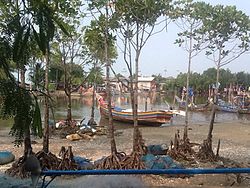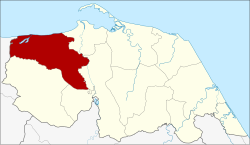Nong Chik district
District in Pattani, Thailand From Wikipedia, the free encyclopedia
District in Pattani, Thailand From Wikipedia, the free encyclopedia
Nong Chik (Thai: หนองจิก, pronounced [nɔ̌ːŋ t͡ɕìk]) is a district (amphoe) in Pattani province, southern Thailand.
Nong Chik
หนองจิก | |
|---|---|
 Bangtawa in 2015. | |
 District location in Pattani province | |
| Coordinates: 6°50′40″N 101°10′43″E | |
| Country | Thailand |
| Province | Pattani |
| Seat | Tuyong |
| Area | |
| • Total | 231.5 km2 (89.4 sq mi) |
| Population (2014) | |
| • Total | 76,630 |
| • Density | 296.6/km2 (768/sq mi) |
| Time zone | UTC+7 (ICT) |
| Postal code | 94170 |
| Geocode | 9403 |
Nong Chik was one of the seven states (mueang) into which the Pattani Kingdom was split in the early-19th century to diminish the power of the often rebellious tributary kingdom. The capital was put in tambon Nong Mai (Yarang District). In 1901 the district office was moved to Tuyong, where it remains.
Due to the district office location in Tuyong, the district was renamed "Tuyong" in 1917.[1] In 1938 it was again renamed "Nong Chik".[2]
Neighboring districts are (from the east clockwise): Mueang Pattani, Yarang, Mae Lan, and Khok Pho of Pattani Province; and Thepha of Songkhla province. To the north is the Gulf of Thailand.
Nong Chik is the center of the two year-old Orangpantai Fishing Enterprise (literally, 'sea gypsy company'). It is a cooperative that specializes in the catch, preparation, and sale of preserved fish.[3] Its specialty is salted four-finger threadfins, locally known as plaa kulao, as well as salted spotted mackerel or plaa insee, dried squid, and smooth-textured shrimp paste.
The majority of its members belong to the Pattani Provincial Small-Scale Fisher Network Association, which works with local fishermen to conserve marine resources. Association members have one important rule—they must refrain from using destructive fishing gear and nets that trap juvenile fish as by-catch. The enforcement of this rule has caused fish stocks in the area to rebound.[4]
Nong Chik is divided into 12 sub-districts (tambons), which are further subdivided into 76 administrative villages (mubans).
| No. | Name | Thai | Villages | Pop.[5] |
|---|---|---|---|---|
| 1. | Ko Po | เกาะเปาะ | 3 | 3,712 |
| 2. | Kholo Tanyong | คอลอตันหยง | 8 | 5,788 |
| 3. | Don Rak | ดอนรัก | 7 | 5,362 |
| 4. | Dato | ดาโต๊ะ | 5 | 2,799 |
| 5. | Tuyong | ตุยง | 8 | 12,751 |
| 6. | Tha Kamcham | ท่ากำชำ | 7 | 7,159 |
| 7. | Bo Thong | บ่อทอง | 9 | 12,991 |
| 8. | Bang Khao | บางเขา | 7 | 7,866 |
| 9. | Bang Tawa | บางตาวา | 2 | 3,574 |
| 10. | Pulo Puyo | ปุโละปุโย | 9 | 7,570 |
| 11. | Yabi | ยาบี | 6 | 3,760 |
| 12. | Lipa Sa-ngo | ลิปะสะโง | 5 | 3,298 |
There are two sub-district municipalities (thesaban tambons) in the district:
There are 11 subdistrict administrative organizations (SAO) in the district:
Seamless Wikipedia browsing. On steroids.
Every time you click a link to Wikipedia, Wiktionary or Wikiquote in your browser's search results, it will show the modern Wikiwand interface.
Wikiwand extension is a five stars, simple, with minimum permission required to keep your browsing private, safe and transparent.